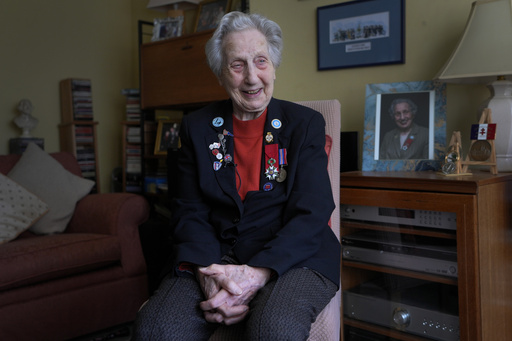LONDON (AP) — On D-Day, Marie Scott experienced British forces landing on the Normandy coast through her earphones.
Stationed in an underground tunnel 100 feet (30 meters) below the south coast of England, Scott was safe from the carnage. But she heard it all.
As a 17-year-old radio operator in the Women’s Royal Naval Service, she relayed messages to the Normandy beaches and waited for the recipient to open his channel and reply.
“And when he did, in my earphones, in my head, I was in the war because what I heard was machine gun fire going continuously. The heavier ones, like cannons. Men shouting. Men shouting orders. Men screaming,’’ she told The Associated Press. “It must have been horrifying on those beaches. The Germans had machine gun nests that were very well concealed and they just mowed them down as they went on the beaches, and I could hear all that.”
Scott was one of some 700 people who worked at Fort Southwick, the communications center for D-Day, where military personnel gathered information about the landings and kept senior officers informed about what was happening on the beaches and in the English Channel.
Operating a radio set on the most important day of the war was a big job for a teenager who had joined the Wrens less than three months earlier.
Scott’s formal education ended when Nazi bombers began pounding London. She soon went to work for the General Post Office, which ran Britain’s telephone system, and was trained as a switchboard operator.
That gave her skills the military needed as Britain prepared for D-Day, and the Wrens snapped her up even though she wasn’t yet 18, the normal age of enlistment.
The military trained her in the then-revolutionary technology of VHF radio, in which only one party could transmit at a time. After delivering their message, operators had to stop and listen to the response. Think of old movies where speakers end transmissions by saying “over” as a signal for the other party to speak.
Deep underground at her duty station, Scott worked 48-hour shifts with 24 hours off in between.
Then came June 6, and the sound of war filled her ears.
“The signaler who was sending messages back from the beaches, he must have been so courageous. Just to sit there sending messages when all around him fireworks were going off. I mean, cannon, everything. Guns of every description. So, yes, I take my hat off to that signaler that day. Incredible,” Scott said.
“I mean, I was deep underground, very safe, but he wasn’t.”
She never knew his name or whether he survived.
“He was a voice, just a voice. As was mine.”
After the war, Scott got married and raised a family. She put her well-tuned ears to use indulging her love of opera.
On her wall is a picture of La Scala opera house in Milan. Maybe one day she’ll go.
Scott, now 97, isn’t bitter that the contributions women made to the war effort have received little attention. The way she sees it, men made the bigger sacrifices.
But there is also pride in having been awarded the Legion d’Honneur, France’s highest order of merit, for her role on D-Day — even if the letter informing her of the prize was addressed, “Dear Sir.”
“Some wars just have to be fought,” she said. “And I think, quite honestly, World War II was just such a war.”
This website uses cookies so that we can provide you with the best user experience possible. Cookie information is stored in your browser and performs functions such as recognising you when you return to our website and helping our team to understand which sections of the website you find most interesting and useful.
